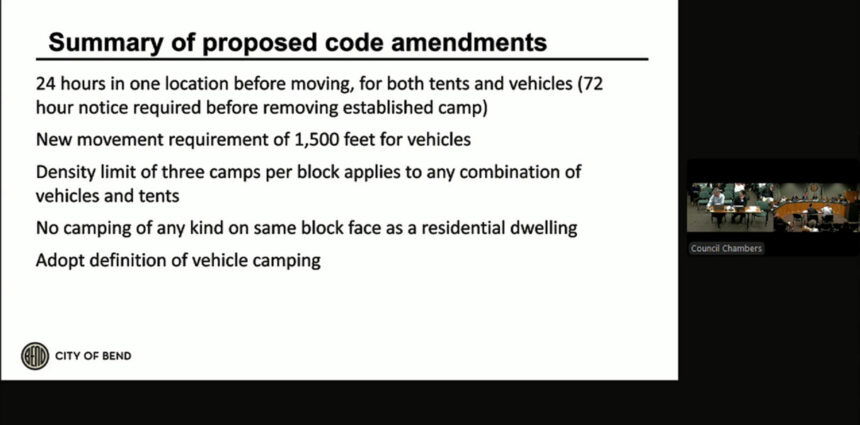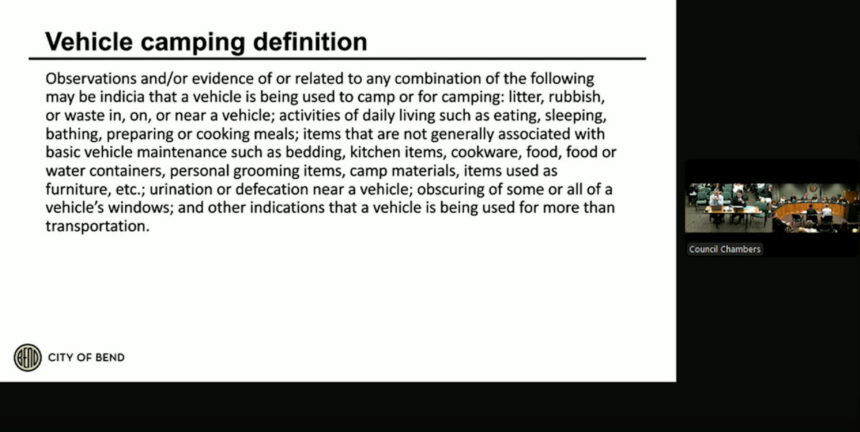Bend councilors vote 6-1 to adopt new rules limiting vehicles used to camp on city streets, closer to rules for tents


Barb Campbell says new rules 'more cruel'; colleagues seek balance with neighborhood impacts
BEND, Ore. (KTVZ) – Bend city councilors voted 6-1 Wednesday night to enact a new vehicle camping code that will be more closely aligned to city regulations for campers in tents along city streets while taking into account RVs. larger footprint and other factors.
Some councilors said they were only supportive of the more restrictive code – saying vehicles being used as streetside homes will get the initial notice to move in 24 hours – because of progress made and more being sought on options from shelter beds and safe parking sites to a new transitional housing facility opening next week in the former Old Mill Inn & Suites.
But in casting her lone no vote, Councilor Barb Campbell – who offered most of a series of failed motions to amend the ordinance – added: “I am opposed to being more cruel to homeless people.”
To which Mayor Melanie Kebler replied: “The comment is not well-taken.”
One successful addition was to review the new rules in a year to see how they’ve worked and if any changes are needed. Another proposed by Councilor Anthony Broadman and backed by most colleagues says camping won’t only be prohibited on the same block face as any homes, but across the street from such as well.
The city’s Human Rights and Equity Commission had come out against the proposal as written and recommended changes, such as leaving the notice to move after 72 hours. But city staff reminded and councilors were aware that the campers deemed to be parked illegally actually will get 72 hours notice to move, as state law requires – and that it really takes two to three weeks to get to a point where any forced move will occur.
Voluntary compliance is always the city’s first effort, and more stringent enforcement for about the past month in problem areas such as NE Watt Way has only led to one vehicle having to be towed, Director of Transportation and Mobility David Abbas said.
Another requirement will be that the vehicles have to move at least 1,500 feet, due to their bigger size, while it’s a block or 600 feet for the minimum tent campers have to move.
Between weekends and staffing issues, it can take up to three weeks to gain compliance now, with a 72-hour initial notice. Making the initial notice 24 hours could shave that to “closer to a two-week” compliance period, Abbas said.
The very lengthy definition of vehicle camping, similar to what other cities have adopted, tries to make sure the city will allow more traditional reasons a vehicle might be parked on a street overnight, even with someone sleeping inside.
City councilors next will be asked to review the parking code, and a three-day general rule requiring parked cars to move probably will be retired, staff said. Campbell said it appeared the city was being “more compassionate to empty RVs” than ones where people live.
During public comments, Justin Gottlieb said his first step toward having a home was to buy a car and live in it on the street. With anything from credit to liability issues, “a vehicle is the best that many can hope for.”
Service provider Chuck Hemingway of the Home More Network, which engages in street outreach, backed the Human Rights and Equity Commission proposal to switch and align the tent camping code to the current vehicle camping rules, changing the 24-hour notice for moving to 72 hours. Campbell later endorsed such a change.
Councilor Megan Perkins said three to four years ago, before the variety of efforts to address the houseless situation, she would not have supported the new rules. And she promised to honor HREC’s work and to work in every way possible to expand safe parking spots while seeking more pressure for state funding to meet those needs.
But while still trying to “do a better job of telling people where you can go,” and creating a “safe, managed outdoor shelter environment,” Perkins said there’s “never a good or perfect time to do this.” And if there are more delays she worries about the impact on neighborhoods, where there’s been a proliferation of vehicles on streets for an extended period.
The goal, she said, is “dignity and safety for all residents, housed and unhoused. I believe we will continue to proceed with voluntary compliance and dignity first.” Councilor Megan Norris said she went on a ride-along to many areas affected by car camping and noted “a lot of emails” from residents concerned about the on-street campers.
